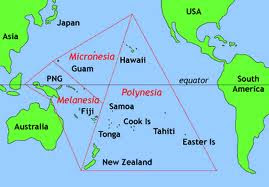France fumed, but the
soi-disant “minister of foreign affairs” of a shadow monarchist government on the Hawaiian Islands called the
Hawaii Kingdom told media this past week that he and his fellow Polynesian separatists were among those buoyed by the
United Nations’ recent reinstatement of
French Polynesia (which includes
Tahiti) on its finger-wagging list of “Non-Self-Governing Territories” (i.e. colonies). The minister,
Leon Siu, called the move “a huge boost to our efforts” of establishing
Hawaii as an independent kingdom—or rather, since they believe it still is one, of garnering international recognition and the opportunity to govern.
The Hawaii Kingdom is one of a whole raft of Hawaiian independence movements, many of them monarchists loyal to either the House of Kamehameha or the House of Kalākaua, and many operating self-styled governments-in-exile of one sort or another. But while Siu and other idealists pursue that dream, Democratic Party politicians in Washington and Honolulu are contemplating another form of sovereignty for Native Hawaiians, and the monarchist sovereigntists are rejecting it out of hand.
 |
| Sen. Daniel Akaka |
Sen.
Daniel Kahikina Akaka, the first Native Hawaiian in the
United States Senate, had long sponsored a bill, the Akaka Bill, which would offer Native Hawaiians a form of sovereignty akin to that of American Indians and
Alaska Natives in the other 49 states. But Akaka retired this year after 23 years’ service and his efforts got nowhere. The new push, by Sen.
Brian Schatz (a non-Native Hawaiian, born in
Michigan to a Canadian father), calls for a direct executive—i.e., presidential—intervention to extend some sort of tribal recognition. As Schatz put it earlier this year, “The president is being asked to consider a number of potential executive actions. That could take many forms, including something by the
Department of the Interior [which includes the
Bureau of Indian Affairs], or at the secretary level or something at the presidential level.”
 |
| Some indigenous Hawaiian separatists use this flag. |
President
Barack Obama, who was born in Hawaii and is of mixed African and European-American ancestry, has not taken a position on the matter yet. But Hawaiian monarchist separatists
are already speaking out.
Kekane Pa, the self-styled Speaker of the House of the
Reinstated Hawaiian Government, says that the “true intent” of the new legislative push “is to have the Hawaii people give up their claim to their native lands to the U.S. government.” An August 27th petition on
the White House website’s “We the People” petition page, titled “We Petition the Obama Administration to Not Bypass Congress by Signing an Executive Order for Federal Recognition of Native Hawaiian,” opposes “tribal recognition” because it seems to attempt to formalize U.S. sovereignty over Hawaii and create a subordinate status for Native Hawaiians.
 |
Barack Obama, a Hawaii native if not a Hawaiian Native,
is being asked to grant “tribal sovereignty” to indigenous Hawaiians. |
Hawaii was an independent kingdom until the mid 19th century, until annexation by the
United Kingdom in the 1840s. The U.S., still a military and economic rival to the U.K., replaced the colonial government with a restored kingdom hemmed in by treaties allowing U.S. corporations access to the archipelago’s resources. An example was the Bayonet Treaty of 1875, which
King David Kalākaua was forced to sign at gunpoint, stripping the monarchy of many of its powers. David’s sister,
Lili‘uokalani, succeeded him in 1891 and attempted to restore the monarchy to its former preeminence, and this prompted an invasion by U.S. Marines in 1893. After a brief time as a U.S. puppet state called the
Republic of Hawaii, the territory was formally annexed in 1898. Ever since, monarchists have argued that, even though Queen Lili‘uokalani surrendered the throne, she did so under duress and that the kingdom’s legitimacy was never extinguished. The
State of Hawaii, created in 1959, is, by this reasoning, illegitimate.
 |
| Early contact |
It is not clear if the Obama administration will entertain tribal recognition. In surveys, the majority of Hawaiian residents, including three-quarters of Native Hawaiians (who are imperfectly counted but probably number between 10% and 20% of the state’s population), support some form of federally recognized sovereign status. Meanwhile, supporters of full independence for the state reached only, for example, the 27% mark in 1995. It is not clear that the monarchist sovereigntists have the people on their side either. Their online petition has been taken down, but at last count it had only 53 signatures.
 |
| A protest organized by the group Hawaiian Kingdom |
[Also, for those who are wondering, yes, this blog is tied in with a forthcoming book, a sort of encyclopedic atlas to be published by Auslander and Fox under the title Let’s Split! A Complete Guide to Separatist Movements, Independence Struggles, Breakaway Republics, Rebel Provinces, Pseudostates, Puppet States, Tribal Fiefdoms, Micronations, and Do-It-Yourself Countries, from Chiapas to Chechnya and Tibet to Texas. Look for it some time in 2013. I will be keeping readers posted of further publication news.]







No comments:
Post a Comment